










St Edward's College is a member of the Edmund Rice Education Australia (EREA) national network of schools. It is governed by Edmund Rice Education Australia NSW College Ltd. The Trustees of Edmund Rice Education Australia has responsibility for St Edward’s and other Christian Brothers’ schools across Australia.
The Annual College Report provides parents and the wider school community with fair, accurate and objective information about various aspects of College performance and development. Prior to publishing this report the College reviews its achievement of College development priorities and sets its priorities for the year to come, all of which is included in the report.
This report is a legislative requirement under the Education Amendment (Non-Government Schools Registration) Act 2004.
The information in this report is complemented by other College publications such as the College prospectus and newsletters. The prospectus is distributed to parents when asking about enrolment and the newsletters are available on the College website www.stedwards.nsw.edu.au


St Edward’s College is a highly valued member of the Edmund Rice Education Australia (EREA) national network of schools which deliver learning through the charism of Blessed Edmund Rice underpinned by the four Touchstones of Liberating Education, Gospel Spirituality, Inclusive Community and Justice and Solidarity. This strong national network consists of 55 schools in every state and territory serving approximately 40,000 students within a wonderfully diverse range of learning communities.
EREA NSW Colleges Ltd is the governing body for the seven mainstream NSW schools in Greater Sydney, Wollongong and Gosford, with enrolments of 8,500 students and 956 staff.
EREA NSW was established to enable more proximate governance for the NSW schools in the Edmund Rice tradition.
The eight member EREA NSW Colleges Ltd Board has governing responsibility for the schools, specifically including ensuring the highest standards of child safety are met, oversight of compliance, staff experience and student experience including teaching and learning.
Across our network, we have witnessed our students excel academically, engage in meaningful service, and grow into compassionate leaders. The dedication of our educators and the support of our families have been instrumental in fostering an environment where every student can thrive.
I would like to take this opportunity to thank the many community members who make our schools great places to learn and grow. To our parents, our school leaders, our staff, our advisory council members, our board members, our Old Boys and the many people who contribute without an official title, thank you for your care, wisdom and generosity of spirit.
To our young people in our schools, thank you for providing the energy and inspiration that brings our community together to strive for greater things.
Maura Manning CEO / Director of NSW Colleges
EREA NSW Colleges Ltd


It gives me great pleasure to present the College Advisory Council’s Report for 2024. This report highlights areas that the Advisory Board was involved in, both discussions and decisions. 2024 saw the year commence once more with a beautiful Opening Mass where everyone, not only celebrates the commencement of another year of learning and friendship, but also where every member of the community, including the Advisory Board, is reminded of the 4 Pillars of St Edward’s education and how these guide all that occurs at the school.
In February of 2024 an evening was organised where all the NSW EREA Board members along with the seven Principals from the NSW EREA schools and the Chairs of each of their school’s Advisory Councils met for a meal and to review the plans for EREA and each of the Colleges for 2024 and beyond. This was a very strategic and beneficial night for all concerned and ensures that all are planning in highly beneficial ways for each of the schools.
This year saw another 12 months of commitment, innovation and dedication of all members of the College to deliver a comprehensive and creative 21st century education that is evident in the HSC results from 2023 and 2024, which are the best in the history of the College. This has occurred through ensuring the school has well qualified and professional teachers who have all participated in professional learning that enhances boys’ engagement in their learning.
The latter has occurred also through careful examination of many aspects of the College. This year the school commenced the process of planning a new strategic Plan for 2025 to 2029. The Advisory Board spent many of our meetings reviewing the process selected by the Executive to ensure the new Plan would be addressing areas of need for new or further development. Following this, the Board had the opportunity to view findings from various surveys taken from all the stakeholders of the College; staff, parents, students, parish.
The Advisory Board highly commends all the staff and especially the Executive on their extensive work in identifying the areas that needed to be strengthened within the new Strategic Plan and also on the final draft of the plan that was completed in Term 4 of 2024. The Advisory Board was asked to comment on every stage of this project and our Term 4 meeting was exclusively on discussing the final draft and then giving our final approval. Special mention must go to the Executive and, especially, to the leadership of the Deputy Principal, Jodie Connor, who led the entire project with the support of Mark Bonnici, the College Principal. We look forward to watching this plan unfold over the next four years.


Our College also continued with its building plans to create the best learning environment. Further classrooms were renovated with air-conditioning added. The Catholic Block Grant Authority has granted funds for the extension of the TAS area to especially allow for an enhancement of the VET Construction area. This project should commence in 2025.
The Advisory Board was always impressed with presentations made at our meetings which highlights endeavours and projects within the College ensuring we are well-informed. The wonderful work continues in the ministry areas and are always impressive including The Waterford Project, Sacramental program and the work occurring Beyond Borders which are essential to ensuring the mission of EREA continues.
The College also continues to make meaningful connections with future students with a number of opportunities for students from all Central Coast schools to attend at St Edward’s. Its success is evident in the continued strong enrolments. The College is also looking to continue developing opportunities for the Senior students to be able to follow both an academic path or a vocational education path. The latter is already showing great success with many Senior students gaining apprenticeships and traineeships.
Finally. I thank all the Advisory Board members who are volunteers and give freely of their time to meet and assist in any way they can in both their areas of expertise and by offering advice where suitable. These members are all invested in seeing that St Edward’s is a highly regarded and successful educational establishment. I particularly thank both Mr Bonnici and Mrs Connor whose organisation of these meetings ensures that the Board is given such detailed and honest information and data to ensure that this group has meaningful impact.
Finally, congratulations to the entire staff, students and parents for another year of outstanding academic, cultural and sporting achievements and we look forward to a successful 2025.
Debra Boyd Advisory Council Chairperson


I would like to extend my heartfelt congratulations to the 2024 graduating class on their exceptional HSC results. It is a great pleasure to share with our community that our results last year reflect the continued improvement in both high-band outcomes and overall learning gains. These results are a testament to the hard work and dedication of both our students and teachers.
The 2024 results have once again surpassed those of the previous year; positioning St Edward’s as the highest-ranked Catholic school on the Central Coast. Additionally, we achieved the third-highest number of top-band results across all schools in the region.
A special congratulations to our distinguished achievers, including Joshua Malek, who achieved an impressive ATAR of 98.9, and Christopher Dodd, who earned an ATAR of 98.55 and was recognised as an All-Rounder for receiving top-band results in every course he studied. We are also proud to share that our students outperformed the state average in several courses, with all subjects achieving their expected learning gain.
Congratulations to our students, teachers, and support staff for their hard work and dedication to this achievement.
It is with great pleasure that we informed our community that Kale Puata of Year 12 was selected to receive a Youth Community Service Award by the NSW Branch of the Order of Australia Association. The Award recognises NSW senior High School students who have shown commendable service to their local communities.
Kale's Contributions:
Kale demonstrated extraordinary commitment to community service, both within and outside of school, showcasing an unwavering dedication to making a positive impact on our local, national, and even global communities.
• Surf Lifesaving: Achieving his silver medallion and serving as a patrol captain, Kale was a vital part of volunteer patrols, ensuring the safety and well-being of beachgoers from


2020-2024. His leadership and dedication in this role exemplify his commitment to serving his community.
• Edmund Rice Sleepouts: Participating in multiple sleepouts, Kale learned about homelessness by spending a night outdoors, deepening his empathy and understanding of the challenges faced by the homeless.
• Coast Shelter: Volunteering to cook evening meals for those in need, Kale's consistent involvement highlighted his compassion and dedication to providing support and care to vulnerable members of society.
• Clean4Shore Program: Actively contributing to environmental conservation through local coastline cleanups, demonstrating a strong commitment to protecting and preserving the environment.
• NSW Youth Advisory Council: Providing valuable insights and contributing to youthrelated discussions and policies, underscoring his dedication to representing and advocating for his peers.
• Justice, Peace, and Advocacy Student Leader Portfolio: Organising and participating in various initiatives, raising awareness about social issues, and promoting positive change within our school and the wider community.
• World Vision Australia: Raising funds through the 40 Hour Famine, showing his commitment to addressing global issues and supporting those in need.
• Push Up Challenge: Leading efforts to raise awareness and funds for mental health, highlighting his dedication to promoting mental health awareness.
• Additionally, Kale completed 100 hours of community service each year while studying at St. Edward's College. This level of commitment and consistency is truly exemplary, earning him the prestigious Edmund Rice Honours award, recognising individuals who embody the values of compassion, justice, and service championed by our school.
Our wonderful Performing Arts Faculty, led by Mrs. Annette Ranking, supported some of our very talented students in auditioning for the Central Coast Youth in Performing Arts (YIPA). YIPA, operating on the Central Coast since 1992, is a series of variety concerts held at Laycock Street Community Theatre in May each year.
We were pleased to announce that the following students were selected to perform in this year’s concerts:


• Logan Atherton and Hoi Tin from Year 8 were selected to perform on piano.
• Thomas Schram of Year 12 was selected as a vocalist.
• Max Taylor of Year 9 was selected to perform on guitar.
• A Year 12 band featuring Rex Allwood , Leon Towle , Matt Frost Foster , Kai Maitland , Dom Fatone , Charlie Jacobsen , Alex Golden , and Liv Saia from St Joseph’s were also selected.
St Edward’s College is committed to maintaining strong connections with our local Catholic Primary schools and has implemented a range of initiatives to foster a positive relationship with young people in these schools. In partnership with St Joseph’s Catholic College, we invited students from each of the Catholic Primary Schools to enrichment days at St Edward’s in Robotics and Music and planned further days in Visual Arts, Science, and Drama.
Throughout the year, several students assisted in the running of gala days and carnivals by officiating as referees in a variety of sports including Football, OzTag, and Touch Football. The feedback we received about our boys was always positive, identifying them as outstanding role models for the younger students. Our boys also commented on their enjoyment in working with young people.
In addition to the enrichment days and refereeing initiatives, Year Ten students participated in a learning assistance program at St Patrick’s Primary School East Gosford. As part of this program, students from St Edward’s and St Joseph’s assisted students in Years 1 and 2 once a week with their literacy and numeracy skills. This was a wonderful learning opportunity for our students, and we congratulate and commend them for their willingness to represent St Edward’s in this program. The students participating in the program this term were: Brendan Ratay, Xander Byrne, Thomas Perham, Eden Pearson
Xander Byrnes : “During my time participating in this program, I found that I enjoyed the new and unique experience of teaching kids who are only just beginning their schooling lives, not to mention the rapport that I build amongst them as the weeks go on.”
Thomas Perham : "Assisting in the learning journey of younger primary students has broadened my understanding of teaching and has been an inspiring, fulfilling experience."


St Edward’s College continued the affiliation with the Edmund Rice Education Beyond Borders (EREBB) Movement. EREBB is a global network of Catholic schools inspired by the charism of Blessed Edmund Rice. EREBB promotes a liberating, inclusive, and transformative education rooted in justice, solidarity, and compassion. By connecting educators and students worldwide, EREBB fosters a sense of global community and shared purpose.
The network enhances learning and teaching quality through collaboration, professional development, and resource sharing. EREBB empowers young people to become agents of positive change, equipped with the knowledge and values needed to build a just and equitable world. Through social justice projects, environmental efforts, and intercultural exchanges, EREBB enriches the educational experience and cultivates empathy, respect, and responsibility.
The two programs which aligned with these principles include:
• St Boniface Teacher Exchange Program
• Immersion to Kibera, Slums of Nairobi
At the end of term 1, Ms. Elissa Bailey and Ms. Kristen Mantellato participated in a teacher exchange program with St Boniface High School, an Edmund Rice School in the Kimberley Region of South Africa. St Boniface provides education for students in Years 7 to 12 from disadvantaged areas in this region. This program is a reciprocal arrangement with St Boniface, and we currently have three teachers from St Boniface visiting St Edward’s for two weeks. We have established a wonderfully rich professional learning experience for teachers from both schools through this program.
As an extension of this opportunity for teachers, we also participate in a global classroom initiative with students from St Edward’s and St Boniface meeting online to engage in crosscultural conversations.


Over term three school holidays, Ms. Terase Killin, Mr. Alex Powell, Mr. Alex Rozario, and students Harvey Olsen, Max Judd, Oscar Woolford, Max Oteiwi, Nicholas Husk, Jonte Wicks, Jaden Roesch, Logan Treble, and Harvey Olsen (all from Year 11) attended the Immersion to Nairobi, Kenya. The theme of the Immersion is "Kesheni," which means "Stay Awake" in Swahili. In attending this immersion, we are challenged to stay awake to the needs of those who are less fortunate.
The program provided us with the opportunity to immerse ourselves in the work of Edmund Rice Ministries in the slums of Nairobi, with the hope of challenging and inspiring us to become agents for change in our own community and to motivate others to support the impoverished and disempowered in our local context. The program also serves to continue to develop and strengthen connections between Edmund Rice Ministries in Nairobi, Kenya, and St Edward’s College.
The immersion provided participants with many wonderful experiences, and the student will be shared their stories of the immersion with students in other year groups throughout the year. I would like to thank Harvey, Max, Oscar, Jonte, Nicholas, Jaden, Max, and Logan for being great ambassadors for St Edward’s College. Ms. Killin, Mr. Powell, Mr. Rozario, and I are very proud of the way in which they immersed themselves fully in every activity, showing great respect, dignity, and compassion towards everyone and every ministry that we visited. Before leaving Australia, we spoke about the importance of opening our hearts and minds to the beauty of Kenya and its people. We were challenged in many ways, but the learnings I am sure have been very rich.
At St Edward’s, we are deeply committed to creating a supportive learning environment where all students feel welcome and cared for. Over the past two years, the majority of our staff have participated in a Mental Health First Aid course, facilitated by our qualified College Counsellors, Marcus and Terase. This registered course equips parents with the knowledge and skills to recognise and respond to mental health challenges faced by their students.
In addition to supporting our students, we are equally committed to empowering our parents with the tools and knowledge to support their children's mental health. To that end, our College Counsellors hosted a Mental Health Workshop for Parents in November of this year
The event was well supported by over ninety parents in attendance.


The College hosted the inaugural Community Christmas Carols event on Friday, December 6 on the College ovals. This special event was a collaboration between St Edward’s College, St Joseph’s College, St Patrick’s Primary School, and St Patrick’s Parish. This was a wonderful evening, featuring performances by students from each school and members of the parish choir, who sang our favourite Christmas carols to help kick off the festive season.
The St Edward’s Football Academy was introduced as an exciting and exclusive opportunity for passionate players to develop their talents and represent their school with pride. In collaboration with the Central Coast Football Association, our academy embraced the coaching and playing structures designed by Football Federation Australia and the English Football Association. Led by highly qualified and experienced coaches, this program offered a unique blend of training sessions, development programs, competitive matches, and opportunities to give back to the community.
2024 Launch of ‘Bungaree’, St Edward’s High Potential Program
Bungaree was an Aboriginal man from the area near Broken Bay, renowned for his sense of humour, resourcefulness, and bravery. St Edward’s College was privileged to have an association with a direct descendant of Bungaree through our Reconciliation Action Plan activities. The name Bungaree was chosen, in consultation with community members and the direct descendants of Bungaree, for the High Potential Learners Program in recognition of Bungaree’s achievements and in celebration of the continued connection of the College to this exceptional man.
High potential students were those who had the potential to perform well above the average level of their age peers in one or more areas. These students learn in different ways to their peers and could move through core learning quicker and with more complex understanding.
Flowing from this, the aim of the St Edward’s High Potential Program is to meet the cognitive and socio-emotional needs of our high potential students. We did this by providing them


with enriched learning opportunities which developed their abilities through quality teaching, and collaboration with like-minded peers, encouraging them to make creative contributions in service to others. In striving for this aim, we hoped our high potential learners would be liberated to achieve their personal best for the betterment of our community and the world at large.
Once a student was identified as high potential, they were offered one or more of the following opportunities:
• Participation in special events or competitions
• Placement in subject-based enrichment classes
• Withdrawal from class to participate in specialised learning groups
Mark Bonnici College Principal


St Edward's College, founded in 1953, was established to address the lack of secondary boys' Catholic schools between Chatswood and Newcastle. Originally owned by the Christian Brothers and since 2008 under the Trusteeship of Edmund Rice Education Australia, the college serves the cause of Catholic education in the Central Coast region of New South Wales. In 2010, the first lay Principal was appointed, marking a significant milestone in the college's history.
St Edward's College is an Independent Catholic boys' college that follows the educational philosophy of Edmund Rice, the founder of the Congregation of Christian Brothers. The college aims to develop the whole person through spiritual, academic, cultural, and physical pursuits, producing 'educated Christian gentlemen'. The college's crest, featuring symbols of faith, endurance, and knowledge, encapsulates its mission.
Situated on a picturesque nine-hectare site on the shores of Caroline Bay, St Edward's College has grown from a modest student population of 72 in 1953 to over 1000 enrolments in 2024. The college caters to boys from Year 7 to Year 12 and offers extensive facilities, including three multi-purpose ovals, a state-of-the-art Shanahan Learning Centre, specialized technology and art facilities, dedicated music facilities, computer laboratories, a Trade Training Centre, and a purpose-built food technology room. The college is wellserved by public transport, ensuring convenient commuting for students and staff.
The College Advisory Council, mandated by EREA NSW Colleges Ltd., advises and assists the Principal in maintaining the governance of the College. It consists of the Principal and nine members representing the school community and operates sub-committees in Mission and Identity, Finance, Marketing and Promotion, WH&S and Compliance, and Strategic Planning.
St Edward’s College is committed to providing a Liberating Education based on Gospel Spirituality within an Inclusive Community, committed to Justice and Solidarity. As a Catholic school in the Edmund Rice tradition, the college aspires to be faithful to the four


touchstones outlined in the Charter for Catholic Schools in the Edmund Rice Tradition. These touchstones guide the college in making the Gospel a living reality in its community, educating for liberation and possibility.
Educating for Justice, Peace, and Advocacy – Reconciliation and Aboriginal and Torres Strait Island Education
Throughout 2024, the Reconciliation Action Plan Committee and St Edward’s College school community continued to implement the College’s strategic goals and aims for building Aboriginal and Torres Strait Islander Education and Reconciliation within the school. Various initiatives were implemented, and programs put into place to support the following goals:
• Increased learning of Aboriginal and Torres Strait Islander cultures
• Upskilling staff in delivering Aboriginal and Torres Strait Islander content/perspectives
• Further links and relationship building with the local community
Throughout the year, the following was completed to address these goals:
A Connecting to Country Excursion for Year 10 students, where they were taught local Aboriginal stories out on Country and developed their own personal connections to their local environment.
Various Staff Professional Development workshops on clapstick making, cultural competency, and building knowledge of Aboriginal and Torres Strait Islander content for use within the classroom. Multiple overnight staff immersions were completed on Country, where staff learned about culture from local Elders and reflected on how they could use this information in their classrooms and roles at school.
Further connections were made in the community with Bloodline Custodians running and collaborating on numerous incursions and excursions, such as a Year 8 Geography Water in the World Incursion and giving Welcome to Countries at whole school events.
Representation of culture was increased across the College through the display of Aboriginal and Torres Strait Islander flags in high-traffic areas throughout the school. Additionally, the school mural was extended by local Aboriginal artists who shared the meaning and culture behind the artwork with the whole school. A digital package of the mural was also developed


for the school to use in various ways, such as creating sport shirts and using it in official school documentation.
Further connections with the community were established through regular attendance and participation at local Aboriginal Education Consultative Group meetings, where the school hosted meetings and had students and staff nominated and receive awards at the AECG Awards Night. Additionally, connections with families at the school were developed through regular communication and hosting of ‘Yarn Up’ evenings.
Engagement with Aboriginal-owned and run companies to support the education and learning of culture, providing opportunities for all students to connect with culture. The Cultural Choice Association ran the Brighter Future’s Program for students, focusing on learning about culture and developing student wellbeing. Additionally, a ‘Walking Songlines Program’ was developed with Girri Girra Aboriginal Experiences, allowing students to visit culturally important local sites and learn values upheld by the college.
Reconciliation Week and NAIDOC Weeks were acknowledged and celebrated, with students participating in local community events.
Students were upskilled while learning culture through collaboration with the Skill Engineer by completing the Mob Pod, where they developed, worked on, and created multiple podcasts about culture.
Opportunities to learn culture were offered on the Staff Spirituality Day.
Career education and career path guidance were discussed with Aboriginal and Torres Strait Islander boys with the Leader of Careers and external providers. Additionally, an Aboriginal and Torres Strait Islander Careers Expo, “Pathways through Stories”, was organized involving local schools.
At St Edward’s College, our commitment to Educating for Respect is deeply embedded in the Waterford Service-Learning Program, which continues to provide meaningful opportunities for students in Years 8–11 to engage in acts of service and develop a deeper understanding of social justice. Through this program, students are encouraged to look beyond themselves, fostering empathy, compassion, and a sense of responsibility to others.
Each student is expected to complete a minimum of 15 hours of service annually, participating in a wide range of outreach activities such as supporting charitable


organisations, assisting the homeless, and contributing to local community groups. For Year 12 students, participation is optional, though many strive for Edmund Rice Honours, awarded to those who complete over 100 hours of service. In 2024, 29 students from Years 7–12 achieved this honour, demonstrating exceptional commitment to their communities.
Students extended their learning beyond the classroom through real-world experiences that reflect the values of respect, justice, and solidarity. These included:
• Developing empathy and awareness during the St Edward’s College Sleepout
• Volunteering with Surf Life Saving and Disabled Surfing Australia
• Preparing and serving meals at Coast Shelter
• Collecting and donating over 100 Christmas Hampers to St Vincent de Paul and Coast Shelter
• Participating in environmental stewardship through the Clean4Shore Program
• Raising awareness and funds through initiatives such as the Push-Up Challenge and 40 Hour Famine
Discussions of justice, peace, and advocacy are not limited to extracurricular activities they are embedded across the curriculum. In Religious Education, students reflect on their service experiences and explore how their actions contribute to a more just and compassionate society. These reflections are reviewed and refined to support both academic growth and personal development.
Throughout the year, students from Years 7 to 12 engaged with social justice themes through guest speakers and classroom learning. Topics included homelessness, reconciliation, and human rights. A highlight was a visit from a World Vision Australia representative, who spoke about the global impact of student fundraising efforts and how young people can be agents of change.
In English, Religion, and HSIE, students were challenged to think critically about the world around them and their role in shaping it. Examples include:
• Year 8 English students writing persuasive letters to local MPs advocating for change on issues such as asylum seekers and climate action.


• Year 10 Religion students designing social media campaigns inspired by Laudato Si’, Pope Francis’ call to care for our common home.
• Year 10 History students creating museum exhibits that amplify Aboriginal and Torres Strait Islander voices, linking their learning to the Uluru Statement from the Heart and the ongoing struggle for justice and recognition.
The Waterford Project remains a central component of Religious Education, with dedicated time for reflection and values-based learning. All service and advocacy activities are designed to help students understand that they can be a force for positive change locally, nationally, and globally.
Student outcomes in national literacy and numeracy testing NAPLAN 2024
Year 9 R eading
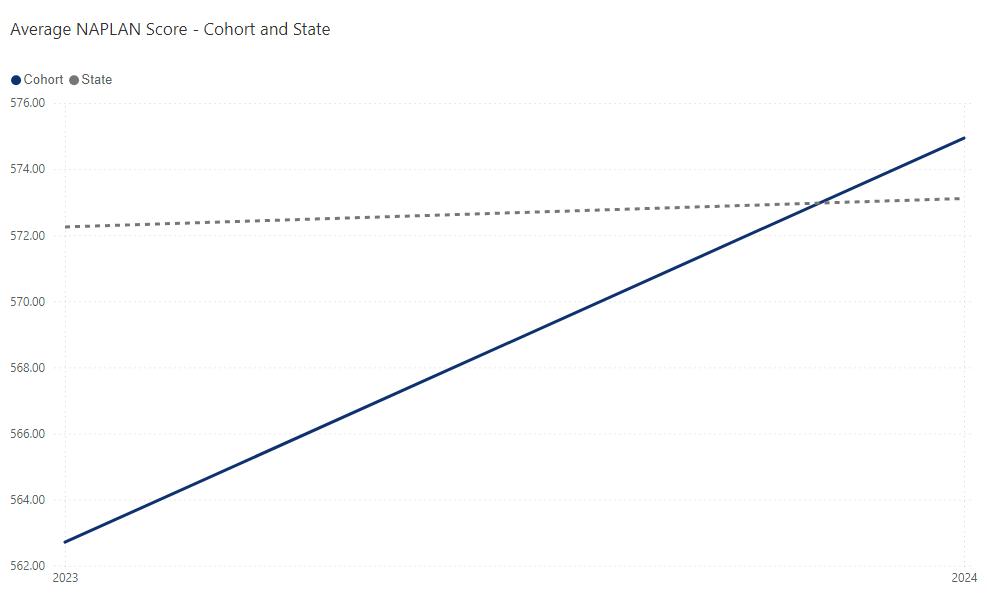
Growth
Year 9 students demonstrated significant growth in Reading, moving from a position well


behind the state average to performing ahead of the state. This marks a notable improvement in comprehension and analytical reading skills.
Strengths
Students showed strong abilities in:
• Interpreting the plot of imaginative texts
• Comparing differing perspectives across two texts on a similar theme.
Weaknesses
Areas for further development include:
• Inferring the writer's intentions in persuasive texts.
• Interpreting information presented in persuasive texts.

Growth
There was a steady incline in Writing performance, in line with the state trend, though overall achievement remains below the state average.


Strengths
Students showed strength in:
• Paragraphing, indicating an understanding of text structure and organisation.
Weaknesses
Key areas requiring attention are:
• Vocabulary development
• Sentence structure.
Year 9 Grammar and Punctuation
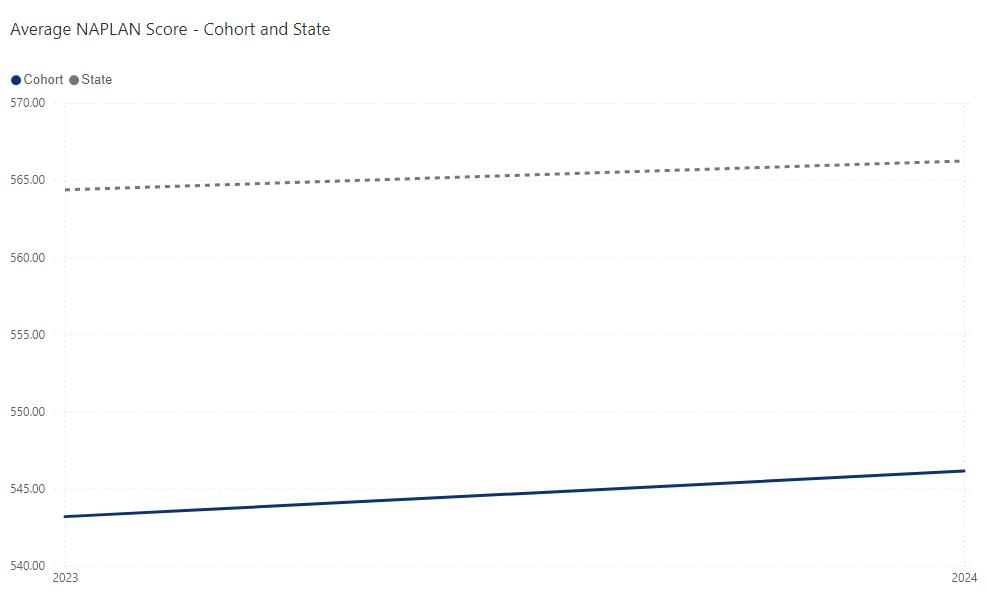
Growth
Students showed a steady increase in Grammar and Punctuation, keeping pace with statelevel growth, though performance is still below the state average.


Strengths
Students performed well in:
• Identifying the correct modal verb to complete a sentence.
• Placing full stops correctly to separate two sentences.
Weaknesses
Challenges remain in:
• Using apostrophes correctly for possession.
• Identifying subordinate clauses to complete sentences.
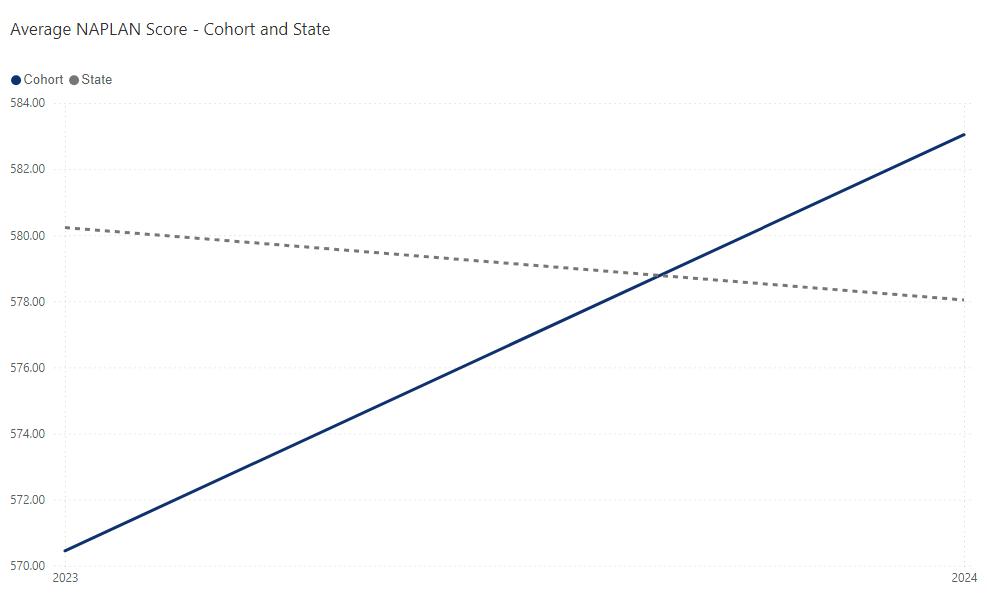
Growth
Numeracy results showed a significant increase, with students progressing from below to well above the state average.


Strengths
Students excelled in:
• Calculating durations between two given times.
• Interpreting scaled instruments to compare volume and capacity.
Weaknesses
Areas needing improvement include:
• Matching 3D objects with their corresponding nets.
• Converting money from cents to dollars.
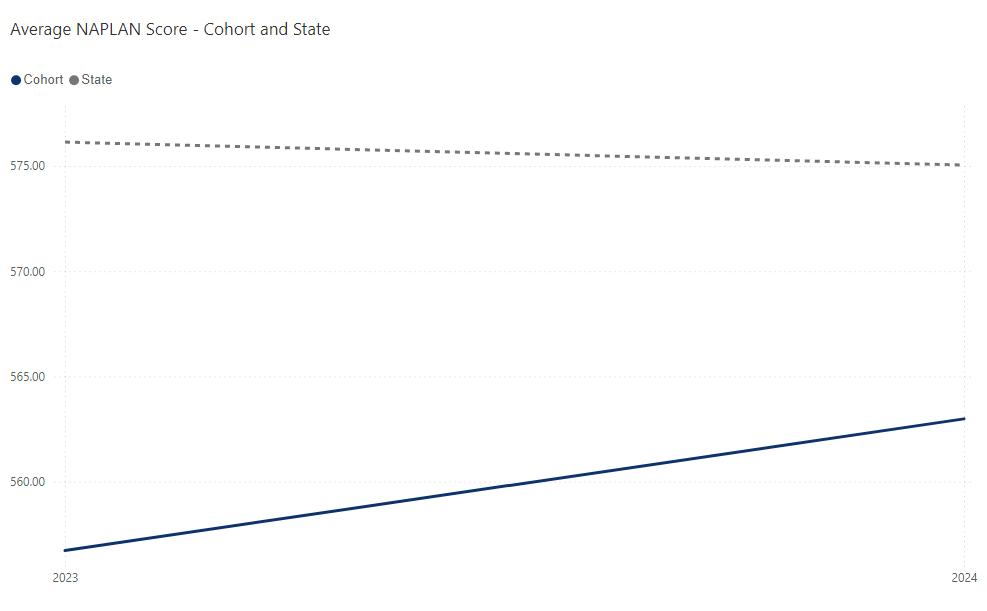
Growth
Spelling saw significant growth, although performance remains below the state average.


Strengths
Students demonstrated proficiency in:
• Spelling 3-syllable words with a final syllable schwa (spelled a, e, i, o, u).
• Spelling 3-syllable words with the /ear/ sound (spelled eer, ear, ere).
Weaknesses
Further focus is needed on:
• Spelling 3-syllable words with the /i/ sound (spelled i, y).
• Spelling multisyllabic words with the /sh/ sound (spelled ci, ti, ch).
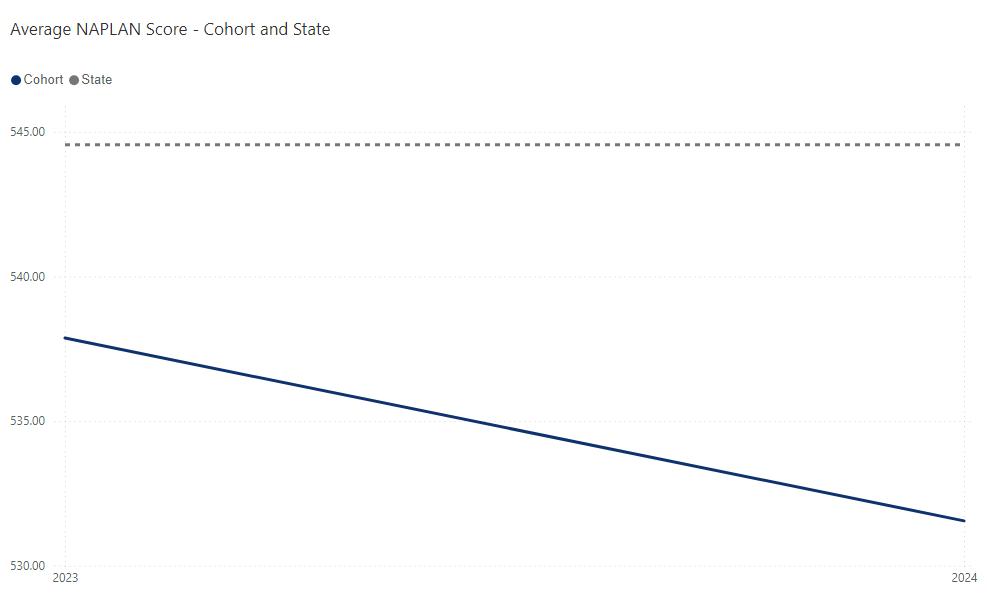
Growth
Year 7 students experienced a significant decline in Reading performance and remain below the state average. This indicates a need for targeted intervention in reading comprehension and analysis.


Strengths
Students demonstrated the ability to:
• Evaluate the accuracy of statements using information from persuasive texts.
• Interpret the meaning of phrases in informative texts.
Weaknesses
Despite some strengths, students struggled with:
• Evaluating the accuracy of statements consistently across persuasive texts.
• Inferring the writer's intentions in persuasive texts.
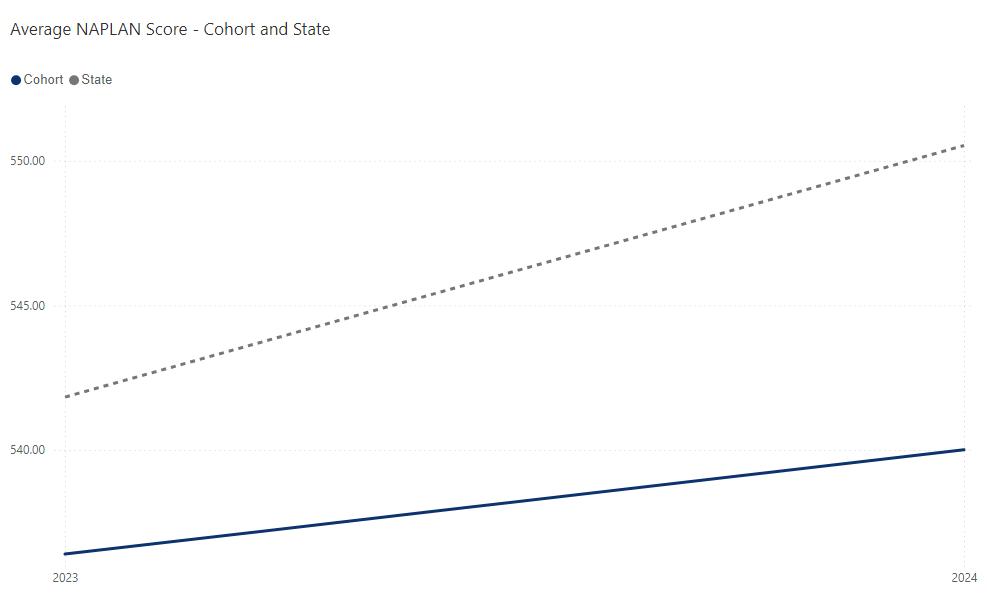
Growth
There was a steady incline in Writing, in line with the state trend, though overall performance remains below the state average.


Strengths
Students showed strength in:
• Paragraphing, indicating an understanding of text structure and organisation.
Weaknesses
Areas needing improvement include:
• Sentence structure, which affects clarity and coherence in writing.
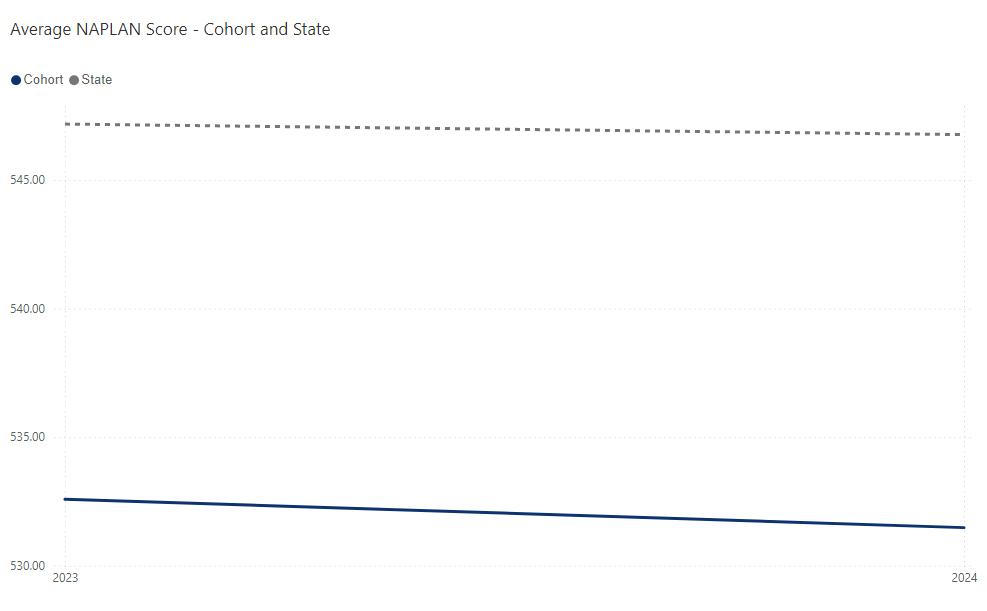
Growth
Grammar and Punctuation results showed a steady decrease, mirroring the state trend, with performance still below the state average.


Strengths
Students performed well in:
• Placing apostrophes correctly for both contraction and possession.
• Using capital letters appropriately at the beginning of sentences.
Weaknesses
Students found difficulty in:
• Identifying sentences that contain verbs in the present tense.
• Recognising nominalisation within sentences

Growth
Numeracy showed a steady increase, though students remain below the state average.


Strengths
Students demonstrated proficiency in:
• Rounding numbers to a given degree of accuracy.
• Solving subtraction problems involving fractions and whole numbers.
Weaknesses
Further development is needed in:
• Solving problems involving elapsed time and understanding am/pm notation.
• Calculating perimeter in applied contexts.
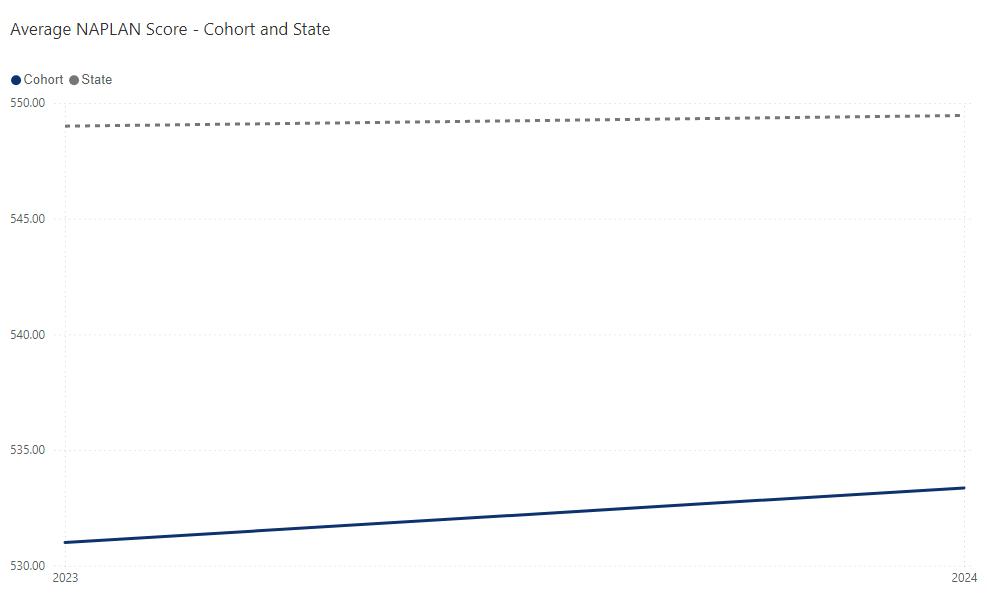
Growth
Spelling results showed a steady increase, consistent with the state trend, though still below the state average.


Strengths
Students showed strength in:
• Identifying and correcting errors in multisyllabic words ending in -ery.
• Spelling multisyllabic words ending in -ian correctly.
Weaknesses
Challenges remain in:
• Spelling 3-syllable words with correct base word elements.
• Spelling multisyllabic words with a medial schwa spelled a, e, i, o, or u.
In 2024, the College continued its commitment to improving literacy and numeracy outcomes through a range of targeted programs and teaching strategies. The NAPLAN results for Year 7 and Year 9 reflect both areas of growth and ongoing challenges, providing valuable insight into the effectiveness of current initiatives and guiding future directions.
Literacy
Year 9 students demonstrated notable improvement, particularly in Reading and Numeracy, where results moved from below to above the state average. This growth is a positive reflection of sustained efforts such as the TEEL paragraph structure across KLAs, English Immersion Days, and collaboration of staff. Writing, Grammar and Punctuation, and Spelling remain areas where students are still performing below the state average, despite steady growth.
In contrast, Year 7 results highlighted a decline in Reading and a steady decrease in Grammar and Punctuation, indicating a need for renewed focus on foundational literacy skills. Strengths were observed in paragraphing and basic punctuation, but weaknesses in sentence structure, vocabulary, and inferential reading skills remain present.
To address these challenges, 2025 has seen the introduction of a Stage 4 Grammar and Punctuation Program, with a focus on the explicit teaching of grammatical concepts. Additionally, professional learning sessions have been aligned with identified areas of weakness, including sentence structure and vocabulary. The implementation of Quick Starts


at the beginning of lessons has also supported the development of foundational literacy and numeracy strategies.
Year 9 students showed significant improvement, moving from below to well above the state average, particularly in problem-solving and interpreting data. Year 7 students demonstrated steady growth, though they remain below the state average. Strengths included rounding and fraction operations, while challenges remain in time calculations and perimeter.
The continued use of Education Perfect as a diagnostic and revision tool has supported numeracy development, and the focus on graphing and perimeter/area remains a priority for the mathematics faculty.
The Career Pathways Programs at St Edward’s College aim to support students in developing the necessary knowledge, skills, values, and attitudes to make informed decisions about their educational and career paths, ensuring active engagement in their future working lives. Research conducted by the Foundation for Young Australians underscores the importance of both credentials and skills in today's competitive job market. Thus, our curriculum focuses on cultivating essential skills such as problem-solving, communication, financial literacy, critical thinking, creativity, teamwork, digital literacy, and presentation skills, which are integral for success in various career paths.
At St Edward’s College, these skills are nurtured through a combination of teaching and learning strategies across the curriculum, as well as through practical workplace experiences. Our dedicated Careers and Vocational Education & Training Leader delivers explicit careers concepts during PDHPE lessons for students in Years 9 and 10. This role is pivotal in facilitating students' transition from school to various post-school options, including university, college, TAFE, employment, traineeships, or apprenticeships.
Our comprehensive Careers Pathways Program encompasses a range of activities tailored to support students' career development journey. These include individual careers guidance meetings, access to online career resources, assistance with subject selection, job preparation support, career exploration opportunities, personalized career planning sessions, self-assessment interest and strengths quizzes, participation in TAFE taster short courses,


real-world work experiences, work placements, and informative presentations from tertiary providers, employers, group training organizations, and TAFE.
The Career Pathways Programs at St Edward’s College are designed to equip students with the knowledge, skills, values, and attitudes necessary for making informed decisions about their educational and career paths. This ensures they are actively engaged in their future working lives. Research by the Foundation for Young Australians highlights the importance of both credentials and skills in today's competitive job market. Therefore, our curriculum emphasises essential skills such as problem-solving, communication, financial literacy, critical thinking, creativity, teamwork, digital literacy, and presentation skills, which are crucial for success in various career paths.
At St Edward’s College, these skills are developed through a blend of teaching and learning strategies across the curriculum, as well as through practical workplace experiences. Our dedicated Careers and Vocational Education & Training Leader plays a key role in delivering explicit career concepts during PDHPE lessons for students in Years 9 and 10. This role is vital in helping students transition from school to various post-school options, including university, college, TAFE, employment, traineeships, or apprenticeships.
Our comprehensive Career Pathways Program includes a variety of activities to support students' career development journey. These activities include parent workshops, careers expo, individual career guidance meetings, access to online career resources, assistance with subject selection, job preparation support, career exploration opportunities, personalised career planning sessions, self-assessment interest and strengths quizzes, participation in TAFE taster short courses, real-world work experiences, work placements, and informative presentations from tertiary providers, employers, group training organisations, and TAFE.
Year 12: 123 students in the year group at the conclusion of the HSC in 2024
• University: 46%
• TAFE: 8%
• Private College: 1%
• Apprenticeships / Traineeships: 14%
• Employment: 12%
• GAP Year: 14%


• Other/unknown: 5%
Year 11: 134 students in the year group at the start of 2024
• St Edward’s College (Year 12): 89%
• Employment/
• Apprenticeship: 5%
• Other school: 3%
• TAFE: 3%
Year 10: 170 students in the year group at the start of 2024
• St Edward’s College (Year 11): 75%
• Employment/ Apprenticeship: 8%
• Other school: 15%
• TAFE: 2%
In 2024, St Edward’s College staff engaged in a wide range of internal and external professional learning opportunities. A total of $47,720 was invested in staff development throughout the year.
Teaching staff participated in 270 professional learning events, comprising:
- 103 external events, including leadership workshops and participation in EREA conferences and immersions held interstate.
- 79 internal or online events.
- 88 collaborative planning sessions conducted on-site at the College.
External events accounted for 81 of the total professional learning activities.


A key priority for the College continues to be staff training in Youth Mental Health and Wellbeing. As part of a three-year initiative, all teaching staff are undertaking a two-day Mental Health First Aid course, delivered by accredited facilitators from Mental Health First Aid Australia. In 2024, this program was extended to include administration and learning support staff, reflecting the College’s strong commitment to ensuring that all students are supported by staff trained in mental health awareness and response.
All staff completed mandatory online compliance training through Complispace, covering:
- Child Safeguarding
- Student Duty of Care
- Work Health and Safety
- EREA Code of Conduct
Additionally, staff renewed their CPR and First Aid certifications at the end of 2024.
As of 2024, the teaching staff at St Edward’s College included:
- 1 Highly Accomplished Teacher
- 82 Proficient Teachers
- 3 teachers who achieved Proficient Teacher Accreditation
- 3 teachers with Conditional Accreditation
- 2 teachers with Provisional Accreditation
The College continues to provide robust internal and external professional learning opportunities to support teachers in meeting the 100 hours of professional development required to maintain their accreditation every five years.
In 2024, the College had 82 teaching staff which included a total of 76 full time and 6 part time teaching staff. In addition, the College employed a total of 42 non-teaching staff. As evidenced in the following table, all teaching staff have a teaching qualification from a higher education institution within Australia and have attained the necessary standard of competence as determined by the Minister of Education.


1 Teacher education qualifications from a higher education institution within Australia or as recognised within the National Office of Overseas Skills Recognition (AEI-NOOSR) guidelines
2 A bachelor’s degree from a higher education institution within Australia or one recognised within the AEI-NOOSR guidelines but lack formal teacher education qualifications.
0
3 Staff of Aboriginal and Torres Strait Islander heritage 1
Student attendance rates for each Year level and the whole school
The average attendance rate for boys at the St Edward’s campus from Year 7 to Year 12 during the 2024 school year was 91.35%. This varied from year group to year group as indicated in the table below.
Attendance Rate by College Year Group
The rate at the St Edward’s campus was on average with the attendance rates of recent years (2023, 89%, 2022, 89.01%, 2021, 94.3%, 2020 93.3%, 2019 91.85%, 2018 93.5, 2017 93.5%, 2016 94.8%, 2015 93.5%, 2014 94.2%, 2013 93.1%, 2012, 93.8% in 2011 93.5%).
The retention rate tracks individual students at two points in their schooling – the end of Year 10 and the end of Year 12 – thereby considering the number of boys in the Year 12 group who left the school between the end of Year 10 and the HSC exams.


Description of how the school manages non - attendance
St Edward’s initiates a range of strategies to restore and maintain regular school attendance.
These include:
• Sound attendance monitoring practices and regular follow-up of unexplained absences by contacting parents promptly. Early SMS and telephone contact with parents are a means of achieving this.
• Resolution of attendance difficulties may require a range of additional school-based strategies including:
o Student and parent interviews
o Reviewing the appropriateness of the student’s educational program
o Development of a school-based attendance improvement plan
o Referral to the school counsellor or outside agency
o Support from school-based personnel
If a range of school-based interventions has been unsuccessful, support may be requested by referring individual cases of unsatisfactory attendance to the EREA Director of Regional Support Eastern Region, who then advises the Catholic Education Commission, NSW. The CEC, NSW manages the process of informing NSW Department of Education and Communities (DEC). Police officers are authorised to act as attendance officers under Section 122 of the Education Act (1990).


Links to publicly available policies - College Policies - St Edward's College
This includes child protection & safeguarding, anti-bullying, discipline, managing complaints and enrolment policies.
Description of parent, student, and teacher satisfaction
St. Edward's College places great emphasis on fostering a strong sense of belonging and interconnectedness within its community, recognizing the profound impact it has on optimizing student learning. Through authentic partnerships cultivated with students, staff, parents, and the broader community, the College is steadfast in its commitment to establishing enduring bonds and fostering crucial mentoring relationships.
In 2024, St. Edward's College conducted comprehensive surveys based on the ACER National School Improvement Tool, involving active participation from parents, students, and staff. This feedback process was integral to the College's commitment to continuous improvement and the development of the new strategic plan.
The surveys revealed that students felt a strong sense of support from their teachers in their learning journeys. A significant majority described their educators as knowledgeable and committed, highlighting their flexibility, open-mindedness, helpfulness, encouragement, and enthusiasm.
Validation from student focus groups further corroborated these positive sentiments, affirming that teachers at St. Edward's College are not only knowledgeable and committed but also caring and deeply invested in the holistic well-being and academic success of their students. This feedback underscores the success of the College's initiatives in fostering a supportive and nurturing educational community.
The surveys revealed that students felt a strong sense of support from their teachers in their learning journeys. A significant majority described their educators as knowledgeable and committed, highlighting their flexibility, open-mindedness, helpfulness, encouragement, and enthusiasm.


Parents expressed confidence in the staff and leadership of the College. They also indicated a desire for more involvement with the girls' school next door. Many parents choose St. Edward's College because of its strong pastoral and wellbeing programs and the support provided to diverse learners.
Staff relayed that they enjoy working at the College and believe it has a healthy culture. However, they also expressed a desire for more wellbeing initiatives to further support their professional and personal growth.
Validation from student focus groups further corroborated these positive sentiments, affirming that teachers at St. Edward's College are not only knowledgeable and committed but also caring and deeply invested in the holistic well-being and academic success of their students. This feedback underscores the success of the College's initiatives in fostering a supportive and nurturing educational community.
The outcomes of the ACER National School Improvement Tool surveys reflect a commitment to continuous improvement and the cultivation of an environment where all members of the community thrive. The College is dedicated to leveraging this feedback to implement targeted interventions that enhance the overall educational experience and foster a safe, inclusive, and nurturing environment for all students.
Financial Information
Summary of financial information, including income and expenditure:
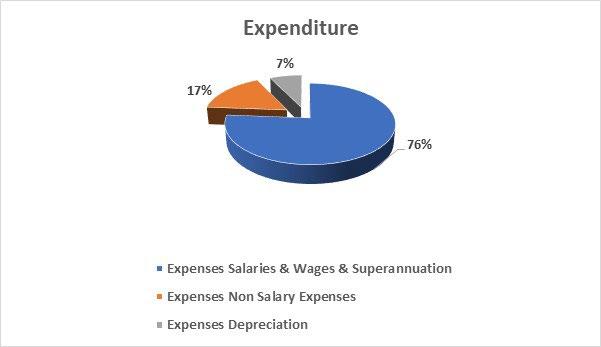


Graphs showing recurrent/capital income and expenditure:
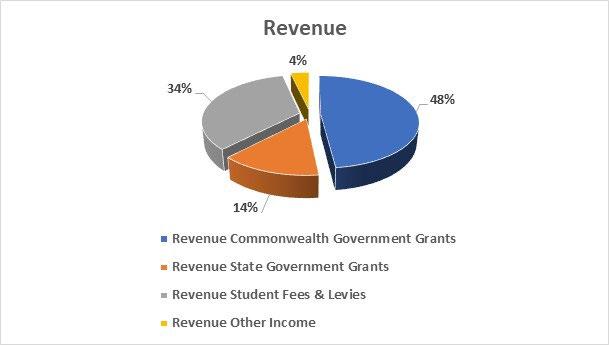


The table below represents the distribution of grades in each subject studied until the end of Year 10 in 2024. The ‘State Average’ grade includes all students in NSW i.e. both boys and girls.
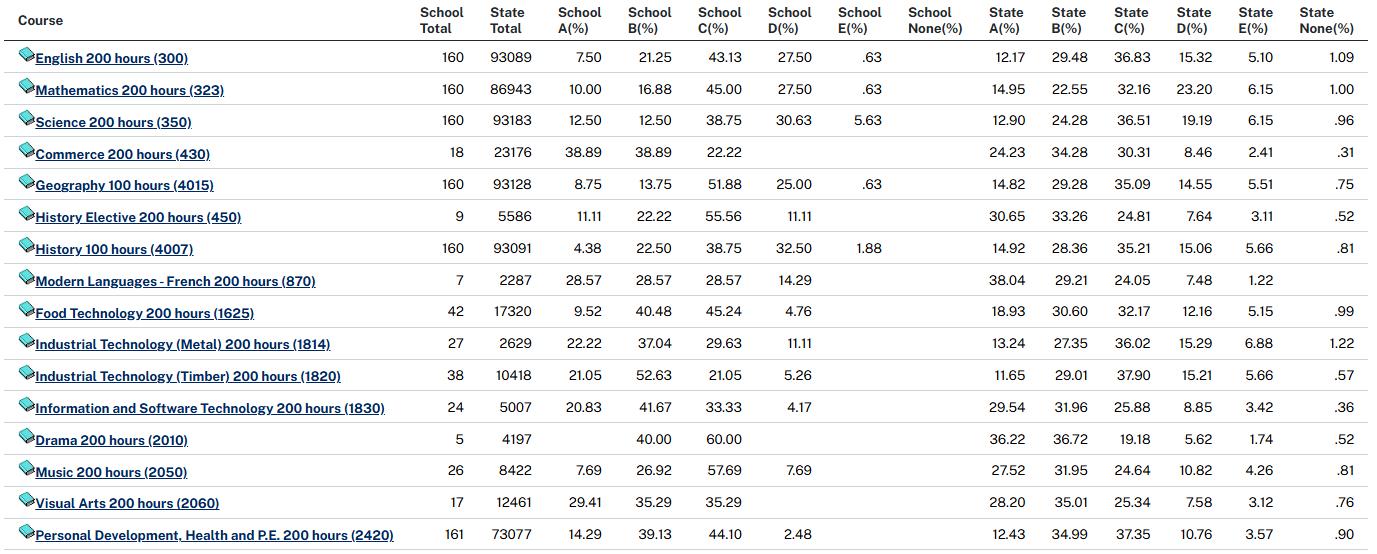


The table below represents the distribution of grades in each subject studied until the end of the Preliminary year in 2024. The ‘State Average’ grade includes all students in NSW i.e. both boys and girls.
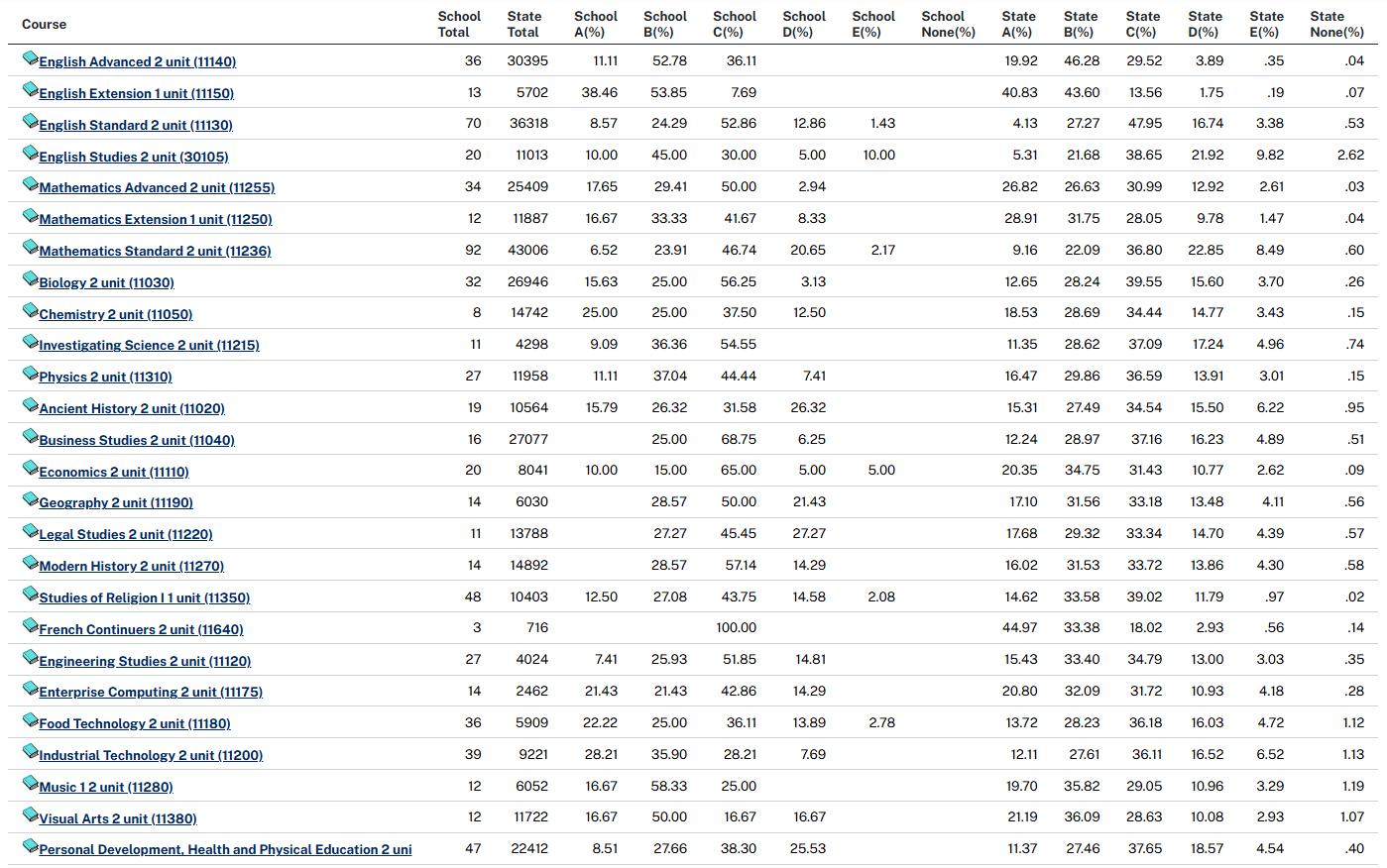


The marks in the table below are out of 100 unless otherwise indicated. The average marks for the whole of NSW (‘State Average’) include marks from both boys and girls. When comparing the marks, it is important to know that girls achieve better results in virtually all HSC courses – hence the ‘State Average’ marks reported below will be higher than the average marks that boys across NSW obtain.







